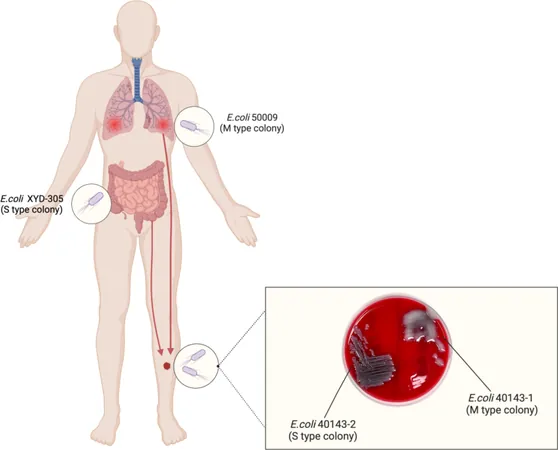
Breakthrough Discovery: How Intestinal Immune Cells Could Combat Food Allergies in Mice!
2025-04-04
Author: Jia
Breakthrough Discovery: How Intestinal Immune Cells Could Combat Food Allergies in Mice!
In a significant advancement in medical research, scientists at Washington University School of Medicine in St. Louis have unveiled vital immune cells in the intestine that play a crucial role in stopping dangerous allergic reactions to food. This discovery comes at a time when nearly 30 million Americans suffer from food allergies, including four million children whose lives are constantly at risk from allergens they may inadvertently consume.
Recent studies have shown that the intestinal immune system is generally adept at distinguishing between harmful threats and harmless substances. However, for those with food allergies, this system mistakenly identifies safe foods as threats, leading to potentially fatal reactions. The study, recently published in the esteemed journal Cell, specifically highlights the role of RORγt-positive dendritic cells, a subgroup of immune cells that prevent inappropriate immune reactions to benign food substances.
Marco Colonna, MD, a leading pathology professor at WashU Medicine, expressed the urgency of addressing this growing health crisis: "The rapid increase in food allergies worldwide is severely impacting the quality of life," he stated. "With limited treatment options currently available, understanding how to target these immune cells opens the door to new therapeutic strategies that could avert or alleviate food allergies."
The mechanism of tolerance to food allergens involves several immune cells that process food particles, presenting them to T cells in a way that teaches them to ignore these harmless intruders. Among these, the recently identified RORγt+ dendritic cells have garnered attention across multiple species, but their critical function in food allergy prevention had not been previously studied until now.
In a recent experiment, researchers treated mice with ovalbumin, a protein known to trigger allergic reactions, both orally and through the nasal route. The results were telling—mice devoid of RORγt+ dendritic cells exhibited signs of severe allergic reactions, including lung inflammation. This contrast starkly revealed the protective role these cells play in maintaining gut health and preventing allergies.
"By removing RORγt+ dendritic cells from the gut in mice, we effectively broke the tolerance to food allergens," explained Patrick Rodrigues, PhD, a postdoctoral scholar and co-author of the study. This pivotal finding has paved the way for further research to explore whether enhancing the function of these cells could avert the onset of food allergies altogether.
Moreover, Shitong Wu, an MD/PhD student and fellow co-author, highlighted the potential implications of their discovery. "Targeting RORγt+ dendritic cells could represent a proactive measure to prevent immune responses from being triggered in the first place," she noted. "If proven effective, therapies aimed at boosting this specific immune cell population could lead to long-lasting tolerance towards food allergens."
This research not only holds promise for food allergies but also for other gut-related immune disorders, such as celiac disease and inflammatory bowel disease. The potential for practical applications of this discovery underscores the urgent need for continued exploration and innovation in therapeutic solutions for food allergies and beyond.
Stay tuned as scientists work to turn this groundbreaking research into real-world therapies that may one day provide relief and safety for millions suffering from food allergies!





 Brasil (PT)
Brasil (PT)
 Canada (EN)
Canada (EN)
 Chile (ES)
Chile (ES)
 Česko (CS)
Česko (CS)
 대한민국 (KO)
대한민국 (KO)
 España (ES)
España (ES)
 France (FR)
France (FR)
 Hong Kong (EN)
Hong Kong (EN)
 Italia (IT)
Italia (IT)
 日本 (JA)
日本 (JA)
 Magyarország (HU)
Magyarország (HU)
 Norge (NO)
Norge (NO)
 Polska (PL)
Polska (PL)
 Schweiz (DE)
Schweiz (DE)
 Singapore (EN)
Singapore (EN)
 Sverige (SV)
Sverige (SV)
 Suomi (FI)
Suomi (FI)
 Türkiye (TR)
Türkiye (TR)
 الإمارات العربية المتحدة (AR)
الإمارات العربية المتحدة (AR)